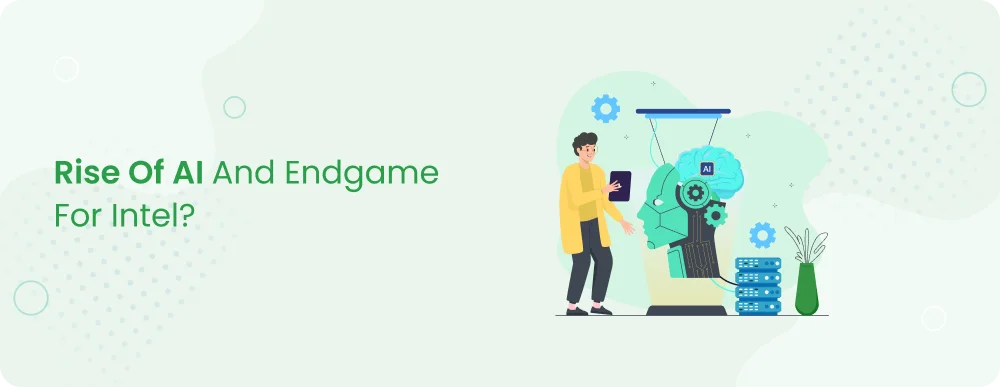Rise of AI and endgame for Intel
Noor Kaur
19 Nov 2024Tags:
Featured
Once a dominant force in the semiconductor industry, Intel is now facing significant challenges, from manufacturing struggles to its slow adoption of emerging technologies like AI and Intel GPUs.
As Qualcomm explores the possibility of acquiring Intel, questions arise about whether this move could help turn around Intel's fortunes or add further complexities for Qualcomm. Keep reading to know more!
Qualcomm's Interest in Acquiring Intel
Qualcomm’s interest in acquiring Intel is driven by its desire to strengthen its position in the Intel tech market, particularly in processors and Intel GPUs. If the deal were to go through, Qualcomm could expand its reach into data centres and AI-based solutions, offering a more comprehensive portfolio that includes wireless and computing technologies.
This acquisition could enable Intel software and Intel products to integrate more seamlessly with Qualcomm’s existing platforms, potentially opening up new opportunities in the mobile and computing sectors.
The State of Intel: A Fallen Giant
Despite still being a leader in manufacturing Intel products like processors, Intel has struggled with production and innovation delays. Competitors like AMD and Nvidia have taken significant market share, and Intel GPUs are now facing stiff competition from more advanced offerings. Moreover, the company’s slow response to technological shifts has led to questions about its ability to regain its former strength.
Major Mistakes That Led to Intel's Decline
One major mistake was Intel’s delay in adopting Intel and AI technologies, while competitors quickly focused on AI and machine learning. Additionally, Intel’s failure to keep up with the demand for better Intel GPUs and mobile processors has allowed competitors like Qualcomm to enter.
The Competitive Landscape: AI and GPUs
Competitors like Nvidia and Intel Qualcomm have taken a strong lead by focusing heavily on AI integration and optimising their GPUs for machine learning and data-intensive tasks.
Intel's Slow Response to AI Technology
While companies like Nvidia ramped up their focus on AI early on, Intel tech was slow to adapt, leaving Intel products at a disadvantage. Today, as Intel and AI applications become more widespread, Intel is playing catch-up, trying to catch up with rivals already integrated into industries like machine learning, autonomous vehicles, and more.
The Importance of the Fabless Model
The fabless model—where companies design chips but outsource manufacturing—has grown in importance, particularly in the GPU space. Companies like Nvidia and Intel Qualcomm have embraced this model to stay agile and reduce costs.
For Intel, sticking to its traditional manufacturing approach has limited its ability to rapidly innovate and scale in the competitive AI and GPU markets. A shift towards a fabless approach could help Intel better compete and adapt to the growing demand for Intel products tailored to AI-driven applications.
Intel's Current Efforts to Revitalise
CEO Pat Gelsinger is leading Intel and is in charge of strategies to revitalise the company and boost its performance, especially in Intel GPUs and Intel software.
Gelsinger’s Strategy for Turnaround
Pat Gelsinger’s strategy focuses on key areas, such as increasing investment in Intel products and expanding Intel tech to better compete with rivals like Nvidia and Intel Qualcomm. One of the major aspects of his plan is accelerating Intel's shift toward AI-driven technologies, such as integrating Intel and AI into future product lines.
Financial Challenges Facing Intel
Intel faces significant financial challenges as it tries to recover from past setbacks. The company’s reliance on traditional manufacturing models and slow adaptation to trends like AI and Intel GPUs have strained its finances.
With increasing competition from companies like Intel, Qualcomm, and Nvidia, Intel must overcome these challenges by improving its profitability, investing in new technologies, and ramping up the production of Intel products suited for AI applications.
Potential Qualcomm-Intel Deal: Roadblocks
The potential acquisition of Intel by Qualcomm presents several challenges that could complicate the deal. Some of these include:
Antitrust Concerns and Regulatory Issues
Combining two major players in the chip market—especially in the Intel tech space—would raise concerns about reduced competition. Global regulators, particularly in the US, the EU, and China, would likely block or heavily scrutinise the deal. The combined company would hold a dominant share in markets like smartphones, PCs, and servers, which could lead to anti-competitive practices and limit consumer choice.
Financial Viability of the Acquisition
While Qualcomm has substantial cash reserves, the acquisition would likely be funded mostly through stock, which could dilute Qualcomm’s shares and raise concerns among its investors. Analysts also note that Intel products and its manufacturing unit, which has faced losses, could burden Qualcomm financially.
National Security Implications
Given Intel’s role in producing critical chips from military technology to AI-driven products, the US government would likely evaluate the potential risks of foreign influence on such a vital industry. This could delay or block the deal, as the government prioritises the protection of sensitive technology.
Conclusion: The Future of Intel
Intel's struggles with its manufacturing unit and slow response to emerging technologies like Intel GPUs and AI leave it vulnerable. Qualcomm's road ahead would involve navigating financial hurdles, regulatory scrutiny, and integrating Intel's diverse operations.
Whether this deal can breathe new life into Intel or burden Qualcomm with more difficulties is uncertain. Still, one thing is clear: Intel's future depends on how effectively it adapts to the rapidly evolving tech landscape.
FAQs
What does Intel primarily manufacture?
Intel primarily manufactures microprocessors, chipsets, and other hardware components used in computing devices. Their Intel products power various devices, from personal computers to data centers.
How has Intel's market position changed in recent years?
In recent years, Intel has faced increased competition from companies like AMD and Nvidia, leading to a decline in its market share. While Intel remains a major player in Intel tech, its position has weakened due to slower product releases and production delays.
What are some of Intel's major products?
Intel’s major products include processors, like the Intel Core series, and Intel GPUs for gaming and professional use. Additionally, the company produces Intel software to support its hardware, enabling performance and optimisation across systems.
How does Intel's technology impact everyday computing?
Intel's Intel software and hardware solutions provide the foundation for many everyday computing tasks, from browsing the web to running applications. Their chips power devices such as laptops, desktops, and mobile devices, ensuring reliable performance.
What role does Intel play in the development of AI and machine learning?
Intel plays a significant role in Intel and AI by providing hardware and software solutions for machine learning and AI workloads. Their advanced processors and Intel GPU technology help accelerate AI development across various industries.
Noor Kaur
19 Nov 2024Related blogs
Sign up to our newsletter !
Share this article on
Recent articles
Tags:
Open a Demat Account in just 15 minutes !

Click on open
account below

Fill out some
basic details

Upload your
documents

Start trading in
24 Hours *
Commonly asked questions
Is Master Capital Services Limited SEBI registered?
Do you have a mobile app for Trading and Finance Management?
What services does mastertrust provide?
What is the minimum investment required to start trading with your company?
Is my personal and financial information secure with your company?
What is your customer support availability?





